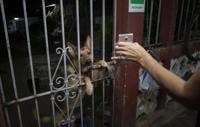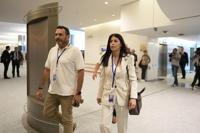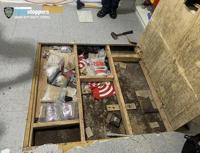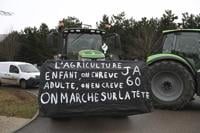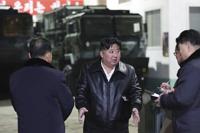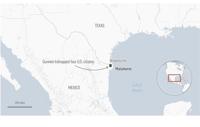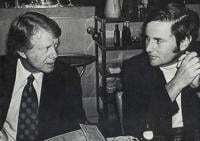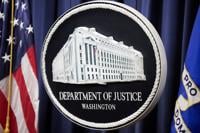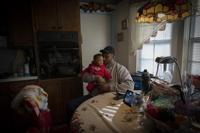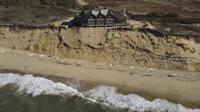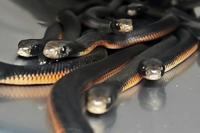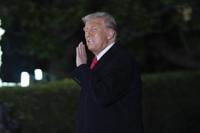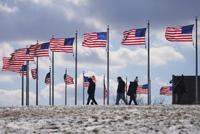HAVANA (AP) — The Rolo González sisters walked out of Nicaragua's main airport and peered out onto a sea of young men.
The Central American “coyotes” squinted back, trying to find the people they would smuggle to the United States. These were the first steps that 19-year-old Merlyn and 24-year-old Melanie took outside of Cuba. Toting two small backpacks and Melanie’s 1-year-old daughter, the women realized just how alone they were.
Their odyssey of more than 4,200 miles (6,000 kilometers) would lead the medical students to question their past lives, race unknowingly against a ticking legal clock and leave them teetering on the edge of death as they tumbled down a cliff.
___
This is part of an occasional series on how the United States became the world’s top destination for asylum-seekers.
___
The sisters' voyage is one that hundreds of thousands of Cubans have made over the last two years in a historic wave of migration, fueled by a crisis in the island's already-troubled economy sparked in large part by the pandemic and one of the world's highest rates of inflation.
The exodus prompted a January Biden administration measure to cut back on Cuban migrants, whom the U.S. had historically welcomed even as it turned away Haitians, Venezuelans, Mexicans and people from other Latin American and Caribbean nations.
The Rolo González sisters, like other Cuban migrants, lost hope for the future in their country. Their optimism rested in the hazy prospect of life in the U.S. and a brighter future for the little girl who would have no memories of the island.
“All you know is that you’re going to a foreign country where you’ve never been, to put your life in the hands of people you’ve never met, to another place you don’t know,” said the younger sister. “You have your destination, but you don’t know what awaits you on your journey.”
___
Over the past two years, American authorities have detained Cubans nearly 300,000 times on the border with Mexico. Some have been sent back but the vast majority have stayed under immigration rules dating to the Cold War. That's more than half the population of Baltimore, or nearly 3% of the people in Cuba.
While they had trained as doctors, the Rolo González sisters spent their free time on the outskirts of Havana scraping together enough to buy basics like baby formula for Melanie’s daughter.
The women once dreamed of traveling as doctors but they quickly grew disillusioned about life in Cuba due to frequent blackouts, medical supply shortages and other restrictions.
When Melanie’s daughter, Madisson, was born, she and her economist husband began to discuss their family migrating to the U.S. He would go first, they decided, and then they would seek to migrate through legal, less dangerous routes.
In May 2022, he flew to Nicaragua. Shortly after, Melanie said, he left her for another woman.
She still planned to migrate, though, now with her little sister.
___
The vast majority of Cuban migrants over the last year have flown to Nicaragua – where Cubans don’t need a visa – and head overland to Mexico. A growing number also take a dangerous route by sea, traveling on packed, precariously constructed boats almost 100 miles (161 kilometers) to Florida.
The sisters sold a house left to them by their father, along with the refrigerator, television and anything else of value in exchange for American dollars. With money from friends and family in Florida, they had $20,000.
It bought the Rolo González sisters flights to Nicaragua and passage overland to the U.S. border with one of the smuggling networks.
They took leave from medical school and told only five close friends and family that they were going.
Days before their flight, the two meticulously sorted through stacks of medicine, winter clothes and powdered baby milk — as much of their lives as they could fit into two blue-and-pink backpacks.
The sisters, like many other Cubans, were counting on the relative but soon-to-disappear ease with which Cuban migrants could enter the U.S.
___
Just after midnight on Dec. 13, the Rolo González sisters walked past a hallway lined with family photos and out of their home potentially forever.
The last thing they told their mother before leaving her standing alone in the Havana airport was “I love you.”
“Until then, it seemed unreal to me,” said the younger sister. “When I saw myself sitting there on the plane, the only thing I thought about was what we had achieved. When the plane took off, we looked at each other and said ‘We’re free.’”
They walked out of the Nicaragua airport with a smuggler who had a picture of them on his phone and received instructions via WhatsApp.
It was time to make the first payment: $3,600 in cash.
Their “guide” was a vague, but constant presence, sending them messages with instructions as they were handed off smuggler to smuggler.
Once they paid, they began a 12-hour drive with the “coyote," arriving at a ramshackle house at midnight. They were awoken before sunrise. With chilly air cutting at their lungs, Melanie and Merlyn began to trek through a rugged mountain dotted with corn and coffee farms – the border between Nicaragua and Honduras.
The sisters continued this way for days, winding up through Honduras and Guatemala by bus, car, and foot along Central America’s volcano-speckled landscapes.
They marveled at jagged mountains and rolling clouds as endless as the oceans that had once surrounded them.
“Everything was new,” said Merlyn, “It felt like: ‘We’ve left Cuba.’”
Back in Cuba, their mother clung to texts and photos as signs they were okay.
“There’s a horrible emptiness in this house. I look over here, look over there and it’s like I have nothing,” she said.
___
The Rolo González sisters dozed and rode along with 18 other migrants at 3 a.m. as their old blue van whizzed through dense pine forests in Chiapas, Mexico in a line of five cars carrying mostly Cubans. They were cutting through an informal passage built by smugglers, and the drizzling sky turned the dirt pathway slick.
Merlyn was cradling her niece when the car slipped and spun, flipping over 10 times as it fell. The jolt threw Merlyn and the baby out of the windshield alongside the driver. The young Cuban enveloped her niece with her body. A piece of glass cut a deep gash in the back of the woman's head.
When she landed on the muddy earth, the woman peered down and panicked as she saw the baby's short strands of hair and face coated in blood as she peered up wide-eyed.
Melanie rushed over, checking the vitals of her family with the light of a phone, and bandaged her sister's head the way she had learned in medical school in Cuba.
In the coming days, they would learn that the mother of an 8-year-old Cuban boy had also died that night.
“We felt like it meant that we had a lot more life to live,” said Melanie.
On New Year's Eve the Rolo González sisters waded through the Rio Grande from Juarez to El Paso in the early morning. They were immediately met by Border Patrol agents, detained in Texas and quickly released under 60 days parole.
Days later, the new Biden restriction was announced. They had made it just in time.
___
Back in Cuba, their mother watched her phone with shaking hands. It had been three weeks since Marialys had seen her daughters and granddaughter.
In Daytona Beach, Florida, family friends waited for them. Balloons decorated their beds and a pink baby cradle in the corner.
Marialys' phone rang. She squinted at the grainy video.
“Look there, there’s the car, there they are!” Marialys cried as a silver car rolled up the screen. Three girls swaddled in jackets walked up the driveway.
“Hola, mami,” one murmured with a smile.
“Se acabó la pesadilla, mi hija,” the mother choked out.
The nightmare is over, my daughter.
___
Associated Press journalist Ariel Fernandez contributed to this report.


